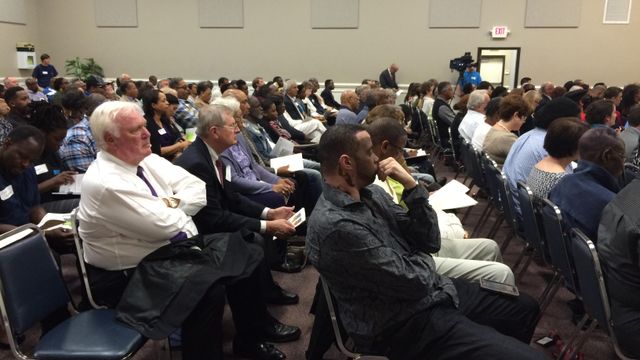Raleigh residents, officials hope understanding helps prevent social unrest
Raleigh residents and officials gathered at Martin Street Baptist Church on Wednesday for a town hall meeting to foster communication and understanding to help prevent the social unrest that has happened in Baltimore and Ferguson, Mo.
Posted — UpdatedIncidents in these cities within the past year have fueled ongoing debate regarding race relations in the United States, especially when it comes to interactions between police officers and African-American residents, and exposed differences in how whites and blacks view the country’s racial and economic progress.
After Michael Brown was shot and killed by a Ferguson, Mo. police officer in Aug. 2014, 37 percent of whites said the incident raised important issues about race, compared to 80 percent of blacks, according to a Pew Research Center study.
A recent Pew study found that 50 percent of blacks said poverty greatly contributed to the unrest following the April death of Freddie Gray in Baltimore, while only 39 percent of whites felt the same.
In Ferguson and Baltimore, the aforementioned incidents led to days of rioting, resulting in the National Guard and thousands of law enforcement officers being called in to restore peace amid looting and protests that varied from peaceful to violent.
The unrest, which garnered international headlines, have stayed on the minds of residents and city officials in Raleigh.
Communication and understanding is key in preventing such incidents from happening in the City of Oaks, said those attending a Wednesday night town hall forum at Martin Street Baptist Church.
“I think tonight is a great example of how to avoid (social unrest), and that is to be proactive instead of reactive,” said Rev. Nancy Petty with Pullen Memorial Baptist Church.
For police, establishing trust in the community requires having a relationship with residents, Raleigh Deputy Police Chief Joseph Perry said.
“We pride ourselves on being out of the car more than we're in it, getting out, getting a pulse on the community, what's going on in the community and acting on those concerns as quickly and as effectively as we can,” he said.
Issues discussed during the meeting included improving income inequality and education disparities.
Organizers said they hope discussions will continue in homes, churches and other places throughout the community.
“There is some work to do in Raleigh,” said resident Antoine Marshall. “I think we’re better off than some large cities, but there’s still work to be done.”
• Credits
Copyright 2024 by Capitol Broadcasting Company. All rights reserved. This material may not be published, broadcast, rewritten or redistributed.





